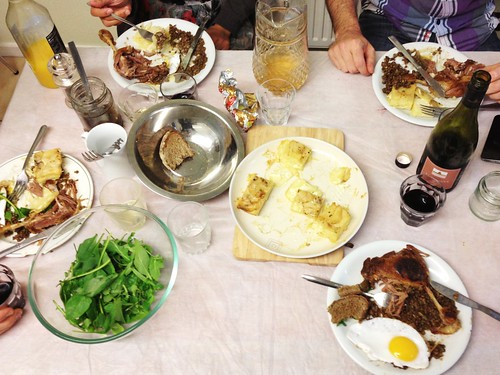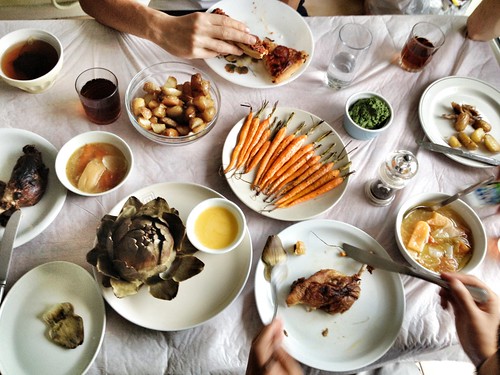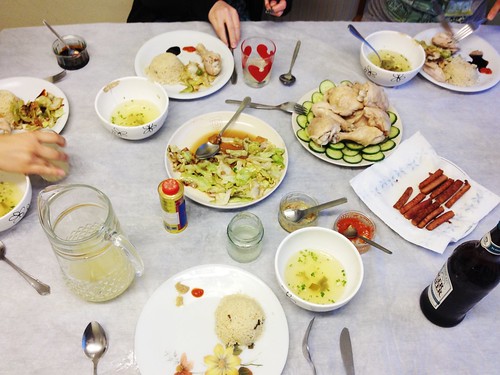Archive
Stewardship of Money and Living in London on a Student Budget
It’s that time of the year when sunny days get colder and the student hordes throng the streets of London. I’ve had a good time meeting the first arrivals, urging them to make the most of their few years abroad.
 It’ll be a sad thing if all they had to show at the end of their degree was, erm, a degree, selfies in front of tourist attractions, signed menus from Michelin restaurants, and a life partner to eat in said restaurants with. There’s much more to life, boys and girls! Away from the usual societal crutches of home, this is the perfect opportunity to think carefully and independently about life – to investigate properly what truth is and so set valid life goals according to that truth. After thorough investigation, Christian claims, as set out in the Bible, seemed overwhelmingly true:
It’ll be a sad thing if all they had to show at the end of their degree was, erm, a degree, selfies in front of tourist attractions, signed menus from Michelin restaurants, and a life partner to eat in said restaurants with. There’s much more to life, boys and girls! Away from the usual societal crutches of home, this is the perfect opportunity to think carefully and independently about life – to investigate properly what truth is and so set valid life goals according to that truth. After thorough investigation, Christian claims, as set out in the Bible, seemed overwhelmingly true:
- the deadly problem we all face is that we are all under the wrath of God for failing to acknowledge him;
- nothing we can ever do or say will be able to turn away God’s wrath on the Last Day;
- but God sent his Son Jesus to save us from this – if we trust that what God promised is true – ie. that Jesus’ death is sufficient to save us from the consequences of our sin.
Because this is such an important thing for this life and the next, I would highly recommend everyone to research this for themselves. A Christianity Explored course is a great place to start! And London universities are well served by good churches like St. Helen’s Bishopsgate and Euston Church.
While the important stuff gets sorted, there are also daily necessities to consider. (Ah but, really, who ultimately provides us with money to buy food with, enables food to grow as they should, regulates the seasons, gives us breath?) As a student at a Bible course, living off my own savings, I had to be careful about spending, but also not let frugality be an idol; to be so able to work the budget as still to be generously hospitable about housing and feeding people. We usually think that “good stewardship” of God-given money consists merely of avoiding conspicuous consumption, but miserliness too fails to properly invest God’s money for his work.
Food
Because the United Kingdom produces its own food and local food is more likely to be less expensive, it is best to eat the season.
Street markets are your best bet for fresh food. I don’t mean the organic hipster places but the “ethnic” sort in East London – for example, along Whitechapel or in Shadwell. Vegetables are usually sold by the bowl – £1 for whatever is in the bowl. And I have managed to bargain for more to be stuffed in the same bowl…
Check London Farmers Markets for more English/continental produce. Although basics are on the whole more expensive, this is for you if you care about provenance. And there are some bargains at closing time or on things that don’t usually figure in the modern London kitchen – like duck hearts, other offal, pork bones for ramen bases. Even the more posh farmers’ markets are worth checking out: I’ve gotten good bags of pesticide-free fruit and vegetables for £1 each at the Marylebone Farmers’ Market and chicken carcasses for stock (but with enough flesh left on it for a meal for one or two) for 25p each at Borough Market.
It’s also worth being a regular at your local butcher and fishmonger who may throw in stuff for free once they get to know you.
Foraging has saved me a bundle on fruit and herbs. But obviously you need to be sure not to poison yourself, especially with the mushrooms. Check out recipes and advice at Forage London.
 If you really need to use a supermarket, you can compare prices at mysupermarket.co.uk. There isn’t a particularly generally cheap(er) mainstream supermarket: Tesco and Sainsbury’s might sell different goods more cheaply. Lidl, Aldi, and ASDA, although not known to be upmarket, have own-brand products that stand up to more expensive own-brands: like olive oil and charcuterie. Check for Great Taste Awards as well. There are also treasures in Lidl’s wine bins (eg. Bordeaux second growths).
If you really need to use a supermarket, you can compare prices at mysupermarket.co.uk. There isn’t a particularly generally cheap(er) mainstream supermarket: Tesco and Sainsbury’s might sell different goods more cheaply. Lidl, Aldi, and ASDA, although not known to be upmarket, have own-brand products that stand up to more expensive own-brands: like olive oil and charcuterie. Check for Great Taste Awards as well. There are also treasures in Lidl’s wine bins (eg. Bordeaux second growths).
Waitrose does really deep discounts on well-kept but expiring food. I usually snap these up for the freezer – good for lazy evenings and unexpected guests. It’s also worth signing up to be a Waitrose member for free coffee (espresso, cappuccino, latte) and tea daily, additional discounts, and a free well-written magazine every month.

 The other great thing about Waitrose is that it applies original bulk-buy discounts to stickered items. In this instance, Waitrose technically paid me £0.11 to buy 18 sausages off them!
The other great thing about Waitrose is that it applies original bulk-buy discounts to stickered items. In this instance, Waitrose technically paid me £0.11 to buy 18 sausages off them!
Marks & Spencer stores tend to clear out their bakery sections at a good yellow-stickered discount about 6.00 p.m. (store-dependent) every day so you can get proper bread/pastry your dinner/breakfast there. The city center stores are also good for discounts on dairy items like milk and cheese.
Approved Food has a bit of a niche selling food near or past its best before date at good reductions.
Coffee
Brewing your own probably gives you a better cup and saves you loads off Costa lattes. Worth checking out online coffee companies for promotional discounts – eg. Pact Coffee delivers your first order for only £1.
Clothes
By the fact that everyone can tell me a mile away by my clothes, it is clear that I don’t really have much experience in this area. But for fig leaves that don’t look too cheap, TK Maxx has good stuff. There are loads of charity shops around. Also look out for clothes swaps.
For camping/hiking/walking clothes, footwear, and accessories, try the Army Surplus Store
Hair Cuts
Get them free by being a real live model for hairdressing students or juniors. Have a look at this Time Out article for details.
Cookware, homeware and home electricals
Check first if anyone has anything to give away on London Freecycle or Gumtree or a whole list of alternatives on the Guardian Green Living Blog or on the London Re-use Network. Otherwise, compare prices at:
Robert Dyas
Argos
Lakeland
Poundland, 99p shop, 98p shop…
Reuse, Reuse, Reuse
Reuse jars as cups and for storage. Reuse can and coffee cups as pen and pencil holders. Reuse fruit crates for shelves. Reuse wine cases for bookshelves.
Transportation
Cycling around London is free, though you’ll need to acquire a bicycle and an all-important bicycle lock.
Bicycles
Freecycle, Gumtree, . Or ReCycling and other sites listed on Bike Hub. Cycle training, if you live in Tower Hamlets, is free.
You’ll want to keep your ride in good shape, so pop down to the free bicycle maintenance workshops.
Trains
The Man on Seat 61 has good advice about this.
Leisure Activities
It helps to live in areas that the government thinks need a leg up. In Tower Hamlets, for example, there is free tennis and relatively cheap admission to swimming pools.
For theatre, opera, concerts, check out the TKTS website for discounts, or (if appropriate) hunt for student standby tickets or platform seats.
Lots more tips at moneysavingexpert.com.
Summer Camp, More Goodbyes
Mid-goodbye-hug, I was bundled into a moving car and whisked to the rail station by the coast, where a train was about to depart for London. I yearned to linger and prolong 11 days of magnificent gospel partnership…but there was a Glaswegian-Norwegian wedding to witness and celebrate.
 If the same team would have me, I would fly any where in the world to work with them. They were a fantastic mix of commitment to God and his word, godliness, Protestant work ethic, absolute craziness, humility, creative problem-solving, ruthlessness in dealing with sin, patience, sportsmanship, prayerfulness, servant-(arm-down-a-blocked-loo)-leadership. And all this in the extraordinary context of Paul’s second letter to the Corinthians (authentic gospel ministry looks weak and so brings glory to God alone), which we were studying for the week.
If the same team would have me, I would fly any where in the world to work with them. They were a fantastic mix of commitment to God and his word, godliness, Protestant work ethic, absolute craziness, humility, creative problem-solving, ruthlessness in dealing with sin, patience, sportsmanship, prayerfulness, servant-(arm-down-a-blocked-loo)-leadership. And all this in the extraordinary context of Paul’s second letter to the Corinthians (authentic gospel ministry looks weak and so brings glory to God alone), which we were studying for the week.

After the wedding, a week of last meals with good friends and neighbours. I never thought I’d be the one at the door, sending off people going to do work amongst the Chinese in some other bit of London, amongst the posh people in the West Country, amongst the prosperity-gospel-deluded in Africa, amongst the youth in Australia…
 How do you say goodbye? Would that we could squeeze all that love and respect, and all those memories of fierce arguments and of sitting around in companionable silence, all the serious conversations and nonsensical banter, all the snuggling comfortingly in similar weaknesses and navigating our differences, into a small locket and carry that, warming our hearts, for the rest of our lives.
How do you say goodbye? Would that we could squeeze all that love and respect, and all those memories of fierce arguments and of sitting around in companionable silence, all the serious conversations and nonsensical banter, all the snuggling comfortingly in similar weaknesses and navigating our differences, into a small locket and carry that, warming our hearts, for the rest of our lives.
But we can’t. So we eat, and drink, and chat, and take selfies, and wash-up, then someone says,”Sorry, but I need to go. Otherwise, no one gets a sermon on Sunday”. And we part, and life goes on, because there is so much more to be done, and God will give us other partners for the work and companions for the journey. Until we meet again in the new creation.
 Our not-very-smashed version of Massimo Bottura’s Oops I Dropped The Lemon Tart.
Our not-very-smashed version of Massimo Bottura’s Oops I Dropped The Lemon Tart.
Saying Goodbye
Saying goodbye.
 We said goodbye to the first of our neighbours in the same way our neighbourly relationship has always been conducted – over a shared meal, laughter, much banter. He will carry a suitcase of meagre possessions to a wet, windswept land and there speak the good news.
We said goodbye to the first of our neighbours in the same way our neighbourly relationship has always been conducted – over a shared meal, laughter, much banter. He will carry a suitcase of meagre possessions to a wet, windswept land and there speak the good news.
He is thin man not given to grand schemes. His hugs are strong and his handshakes, firm.
 globe artichoke with lemon butter dip
globe artichoke with lemon butter dip
 grilled corn with paprika, fromage frais and parmigiano reggiano
grilled corn with paprika, fromage frais and parmigiano reggiano
 parsnip chips with parmigiano reggiano
parsnip chips with parmigiano reggiano
 homemade cherry ripple ice-cream
homemade cherry ripple ice-cream
We lingered over the table till it was late.
See you later, we said. See you in the new creation.
Clarity in Epistemology, Theories of Truth, Precision in Communication, Facets of Reality, and More Photos of Food
 In between the innumerable barbecues (the English sort requiring shielding with brollies from the London rain) and having people round for dinner, have been pondering the necessity of clarity in thinking about things and precision in communication. (The Tutor first raised it when we were chatting a few months ago about the setting up of apprenticeship schemes in churches. Female Tutor thought this was one of my (very few) strengths, i am not so certain as most of this blog demonstrates… Was also talking about this with Online Bookshopkeeper and wife last month.)
In between the innumerable barbecues (the English sort requiring shielding with brollies from the London rain) and having people round for dinner, have been pondering the necessity of clarity in thinking about things and precision in communication. (The Tutor first raised it when we were chatting a few months ago about the setting up of apprenticeship schemes in churches. Female Tutor thought this was one of my (very few) strengths, i am not so certain as most of this blog demonstrates… Was also talking about this with Online Bookshopkeeper and wife last month.)
Clarity in Epistemology
Possibility of Clarity
But before we even consider the subject, the question should surely be whether there is even the possibility of epistemological clarity*, both for the unbeliever with his unregenerated mind and for the believer living in this fallen world?
One of the most common presuppositions in modern thinking is that the human mind and all it generates (theories in various sciences, humanities) should have the utmost claim to the authoritative interpretation of reality. But if Scripture is right**, human brain power cannot be the ultimate in the process of evaluation, because it is corrupted by sin:
18 For the wrath of God is revealed from heaven against all ungodliness and unrighteousness of men, who by their unrighteousness suppress the truth. 19 For what can be known about God is plain to them, because God has shown it to them. 20 For his invisible attributes, namely, his eternal power and divine nature, have been clearly perceived, ever since the creation of the world, in the things that have been made. So they are without excuse. 21 For although they knew God, they did not honour him as God or give thanks to him, but they became futile in their thinking, and their foolish hearts were darkened. 22 Claiming to be wise, they became fools, 23 and exchanged the glory of the immortal God for images resembling mortal man and birds and animals and creeping things.
24 Therefore God gave them up in the lusts of their hearts to impurity, to the dishonouring of their bodies among themselves, 25 because they exchanged the truth about God for a lie and worshipped and served the creature rather than the Creator, who is blessed for ever! Amen.
26 For this reason God gave them up to dishonourable passions. For their women exchanged natural relations for those that are contrary to nature; 27 and the men likewise gave up natural relations with women and were consumed with passion for one another, men committing shameless acts with men and receiving in themselves the due penalty for their error.
28 And since they did not see fit to acknowledge God, God gave them up to a debased mind to do what ought not to be done. 29 They were filled with all manner of unrighteousness, evil, covetousness, malice. They are full of envy, murder, strife, deceit, maliciousness. They are gossips, 30 slanderers, haters of God, insolent, haughty, boastful, inventors of evil, disobedient to parents, 31 foolish, faithless, heartless, ruthless. 32 Though they know God’s decree that those who practise such things deserve to die, they not only do them but give approval to those who practise them. (Romans 1:18-32)
- If God has established objective reality (“truth”), and
- humans because of their refusal to acknowledge God as God by worshipping him or thanking him,
- have suppressed the truth about God, then
- they have become so corrupted in their thinking that they are unwilling and unable to know the truth and act accordingly.
This is why Jesus didn’t say that we just need to try a little harder to be good or to turn over a new leaf, but that we need to be born again to see the kingdom of God (John 3:3) – we need a whole new existence.
For we have already charged that all, both Jews and Greeks, are under sin, 10 as it is written:
“None is righteous, no, not one;
11 no one understands;
no one seeks for God.
12 All have turned aside; together they have become worthless;
no one does good,
not even one.”
13 “Their throat is an open grave;
they use their tongues to deceive.”
“The venom of asps is under their lips.”
14 “Their mouth is full of curses and bitterness.”
15 “Their feet are swift to shed blood;
16 in their paths are ruin and misery,
17 and the way of peace they have not known.”
18 “There is no fear of God before their eyes.” (Romans 3:9b-18)
However, as human theories in the sciences and humanities attest, mankind has not been completely blinded to the truth. We have still been made in the image of God (though now flawed), have still been allowed to live in God’s world, and can still observe, dimly, consistencies in the way the world works and, with what we have termed as chemistry, physics, biology etc, have attempted to categorise and explain these consistencies and so predict the outcome of things.
The sad fact is that in our arrogance, we assume that this common grace, this cataracted view of reality should then be the basis on which we judge God. We are ignorant that we are like blind men feeling bits of an elephant.
 Presuppositions
Presuppositions
“How can you believe in God when science says otherwise?” is the usual question thrown about. But this challenge is founded on shaky presuppositions**.
Fundamental to all human thinking, whether in the sciences or in economics or philosophy is that which we call logic and reasoning. However even these are merely epistemological theories following the use of the human mind or human perceptual apparatus. While it is possible that the existence of synthetic a priori stuff or observable phenomena may point to the self-consistency of the Creator, our theories about them cannot limit him, since he alone has established reality and we are merely poor half-blind observers of it. Good try, Descartes, Kant et al.
Further, in logic theory, most science is based merely on inductive reasoning – that is, that its conclusions are merely possible or probable, given the truth of the premises. So its conclusions are actually a not-completely-adequate subset of a not-completely-authoritative theory. To base one’s evaluation of the truth on “what science says” is therefore quite erroneous.
Even further, the scientific method is only one of many ways that humans have come up with to acquire knowledge and analyse the truth. We do not consider the truth in a court of law or in a history book (or even in a newspaper) by requiring similar empirical or measurable evidence.
 a forest of carrot and beetroot greens
a forest of carrot and beetroot greens
Clarity
So then, clarity. There is a sense in which we can and should engage people’s minds in pointing them to the truth. Jesus, the prophets, and the apostles all used language and argument to communicate the truth.
Wonder how many apologetic strangleholds can be broken (humanly at least) by attending to, and interacting with, the other party’s theory of truth. Most of the time, the other party relies on some background in his thoughts but is not yet aware of (i) his truth presuppositions; and so (ii) the diverse methodologies proposed by humans for determining the different sorts of truths. For example, he may assume that all truth must be proved by the narrow epistemological method that pertains to proof of scientific hypotheses, and so neglect the whole school of historiography and historical method in determining the veracity of an account of an event in the past.
But ultimately of course, a change of mind that comes with re-birth, is the work of the Spirit, who is likened to the wind – it blows where it wishes, and you hear its sound, but you do not know where it comes from or where it goes (John 3:8).
 grilled aubergine, tomatoes, with mozarella
grilled aubergine, tomatoes, with mozarella
Precision in Communication
There is a need for clear thinking in the minds of believers too in their theology and doctrine. (For further discussion.)
Additionally, since we should already be of the same mind, there should be precision in our communication with each other (as well as in apologetics of course). How many good-faith arguments (cf. bad-faith trolling) might have been nipped in the bud by parties:
- having clarity on the exact definition of terms used in the argument – most of the time i find i have been arguing at cross-purposes with someone because we’d neglected to first lay out the contents of the package we called “faith” or “gospel” or “God’s sovereignty” or “reading the Bible for ourselves”;
- not succumbing to the false bifurcation that so besets so many political rallies; humbly considering that differing views may be complementary rather than contradictory.
Note that none of this suggests that reality is relativistic (in the sense that there is no objective reality, or that such objective reality cannot be determined). Rather, it wonders whether objective reality is so faceted and our human understanding so limited that the same thing needs to be described in several ways that are complementary and not contradictory to each other. We should not quarrel over the priority of one Scriptural facet over another, if Scripture itself does not prioritise one over the other.
 compote of rhubarb and pear, shortbread crumble, fromage frais and heavy cream
compote of rhubarb and pear, shortbread crumble, fromage frais and heavy cream
*disregarding for the moment questions as to the absolute value of clarity
**how a fallen mind can establish this is a whole other discussion, Münchhausen et al
For own reference, currently reading:
Vern Sheridan Poythress’ Logic
Vern Sheridan Poythress’ Symphonic Theology
Kitchen Experiments and Hermeneutics
Now that School is finally over, have been using rainy days to consolidate and masticate on things. Naturally, this has required the presence of Activities of Minor Distraction – like cooking and baking, the products of which have been greatly appreciated in the innumerable socials that have mushroomed now that summer is really here.
Just like a sustained period of playing around with food gives even an amateur like me some sense of the flavours and textures of ingredients and an idea of how they might fit together, so the last two years of having to handle and teach the Bible daily have been very useful for getting a tiny feel of how God’s word in Scripture works.
So a re-look at my hermeneutics, with loads of chatting with great people in both the Local Church and wider family – not a major revamp but a tidying-up and ordering of material. Hermeneutics isn’t just the preserve of biblical scholars and pastors and teachers – it is essential to understand what God is saying in his word because God’s word is essential to the life of his people; every debate in Christian history would, at least in part, be concerned with hermeneutical issues.

smoked tuna on Poilâne sourdough bread

tenderstem asparagus, rocket leaves, broad beans, Pomo Dei Moro tomatoes, mozarella cheese on Poilâne sourdough bread

rump steak, candied radishes, rocket leaves, baby carrots

ox cheek with red wine and port sauce, on wasabi mash potato
Parking some transitional thoughts here for the moment (to be demonstrated at a later time: how each of these points should be backed up by Scripture):
- Assumptions: (i) that the original text of the Bible is God’s word to humankind; (ii) that God has a message that he wanted communicated to its original hearers/readers (as the case may be) and also to his people thereafter; and (iii) that there is therefore a primary meaning to the text (that must be adhered to, precluding postmodern subjective personal “I like to think that this is saying” interpretation) and it is comprehensible to humans.
- Original languages and translation issues. The first step in biblical hermeneutics would be to understand God’s word in its original languages – mainly Hebrew and Ancient Greek. This isn’t something that most of us can do, given that we do not have working knowledge of those languages. But if we are reading the Bible in another language, then we need to keep all the issues of translation (see Robert Stein on The History of the English Bible.) in mind as we exegete (one version of) the English Bible: for example, many words in one language may not have an equivalent in another language, so translators would have to make a decision how to render the meaning of the word without inserting it too awkwardly in the sentence. As a poor alternative, D.A. Carson suggests reading several good (query: good) versions in the destination language.
- Comprehension skillz. The basic toolkit laid out in books like Nigel Beynon and Andrew Sach’s Dig Deeper (and its very imaginatively-named siblings) is useful, but the tools themselves need to be wielded with discernment and finesse in different passages and books of the Bible, without accidentally taking anyone’s eye out. Experience is needed to know which tools to use together and which ones might take precedent over another in each context. Then there are other more specialised instruments generally useful in comprehending any text, eg. understanding the use of rhetorical devices.
- Logic and textual context. Beware errors of reasoning and inference (see Carson’s Exegetical Fallacies and Must I Learn to Interpret the Bible). Remember also that meaning is linked to context. Consider the concentric circles of context: immediate context (eg. in an epistle, its place in the argument), book context (how that particular human author uses language, themes), biblical theological context (eg. covenantal – words might be used differently in the two covenants), canonical context (“analogy of the faith” – Scripture is its own interpreter, because behind the whole of Scripture is one Author – see Michael S. Horton’s (am i the only one who feels compelled to scream “Horton hears a Who” everytime i see his surname?) Interpreting Scripture By Scripture). Beware “canon within a canon” (see Carson’s Biblical Interpretation and the Church).
- Historical and cultural context. God has not given us a culturally or historically-neutral textbook. Beware erroneous generalisations. In relation to injunctions: (i) beware absolutising one-off commands; (ii) understand God’s rationale behind command – what God wants and so how to apply in different cultural context.
- Beware presuppositions. Be aware of how your own historical, cultural, theological presuppositions are affecting your reading of the Bible.
- Getting to Christ. In respect of point (4) on biblical theology and canonical context and point (6), consider (i) the Biblical evidence for Jesus Christ being the controlling factor in all exegesis; and (ii) what this actually means! Consider law and gospel, redemptive-historical, covenantal, typological, anti-type, kingdom of God (God’s people in God’s place under God’s rule), promise-fulfilment etc perspectives. See Graeme Goldsworthy’s Biblical Theology and Hermeneutics.
- Remember that it is God’s word: therefore, any exegesis is done reverently, with a view to sitting under his word.
- Reality check. Remember that we are fallen creatures – therefore our intellect is imperfect. Yet, remember also that we who are God’s children have God’s Spirit within us.


afternoon tea from scratch – homemade scones with homemade strawberry jam

deconstructed apple pie – apple confit, crushed Digestives, homemade caramel, whipped double cream, cinnamon dust

strawberry rosewater watermelon gluten-free cake
John Frame, Doctrine of the Word of God
Easter Lunch and Spirit-filled Worship
We get a long weekend over Easter here in the UK – Good Friday, then Easter Monday. Loads of locals legged it home for the break so it was nice to have the “left-over” people round for lunch after Easter service. A mish-mash of people who hadn’t met before – some had been at the Local Church for almost a decade and some had only visited three times, but all chatting happily and discussing life and doctrine by the end of the meal.
The English lamb shoulders were superb. Bunged 4.5kg in the oven at 120°C just before leaving for the Easter service and they were just about done by the time I’d managed to extricate myself from various happy chats to run home and turn off the oven. Seasoned only with salt, pepper, garlic, and rosemary, the meat was tender and sweet and flavourful without the stench of sheep.
To accompany the baby sheep, we had “truffled” potato dauphinoise and roast carrots and parsnips, and a simple salad of spinach leaves and strawberries with poppyseed dressing:
Before pudding (blood orange almond cake and lemon cream tart), we’d gotten to what it looked like to live as Christians. Happily, because i live in a house full of church associates, Bibles were quickly produced and Romans 12 was pointed to.
I appeal to you therefore, brothers, by the mercies of God, to present your bodies as a living sacrifice, holy and acceptable to God, which is your spiritual worship. 2 Do not be conformed to this world, but be transformed by the renewal of your mind, that by testing you may discern what is the will of God, what is good and acceptable and perfect.
It’s far too insipid and trivial to think of worshipping God as merely a matter of singing and dancing; it is about giving our whole selves over to God, to be living sacrifices. It would be frankly ridiculous to think that God would be interested in just the things produced by our vocal chords or flailing limbs over the period of a few hours – our man-made idols might accept that, but not the real and living God of the whole creation.
And we begin to be able to worship God rightly in our living by first being transformed by our already renewed minds (see previously in Romans). We start by having a right view of ourselves, especially in relation to the church:
3 For by the grace given to me I say to every one among you not to think of himself more highly than he ought to think, but to think with sober judgement, each according to the measure of faith that God has assigned. 4 For as in one body we have many members, and the members do not all have the same function, 5 so we, though many, are one body in Christ, and individually members one of another. 6 Having gifts that differ according to the grace given to us, let us use them: if prophecy, in proportion to our faith; 7 if service, in our serving; the one who teaches, in his teaching; 8 the one who exhorts, in his exhortation; the one who contributes, in generosity; the one who leads, with zeal; the one who does acts of mercy, with cheerfulness.
Worship doesn’t start with wanting the opportunity to use our talents to the full within the body or some other form of self-fulfilment; it starts with understanding that we all contribute to life in the body of Christ, and also that we are innately inter-dependent (“individually members one of another”!). And so we serve with the right attitude.
9 Let love be genuine. Abhor what is evil; hold fast to what is good. 10 Love one another with brotherly affection. Outdo one another in showing honour. 11 Do not be slothful in zeal, be fervent in spirit, serve the Lord. 12 Rejoice in hope, be patient in tribulation, be constant in prayer. 13 Contribute to the needs of the saints and seek to show hospitality.
14 Bless those who persecute you; bless and do not curse them. 15 Rejoice with those who rejoice, weep with those who weep. 16 Live in harmony with one another. Do not be haughty, but associate with the lowly. Never be wise in your own sight.
How diametrically opposed to the hell-ish reality described in Romans 1:
18 For the wrath of God is revealed from heaven against all ungodliness and unrighteousness of men, who by their unrighteousness suppress the truth. 19 For what can be known about God is plain to them, because God has shown it to them. 20 For his invisible attributes, namely, his eternal power and divine nature, have been clearly perceived, ever since the creation of the world, in the things that have been made. So they are without excuse. 21 For although they knew God, they did not honour him as God or give thanks to him, but they became futile in their thinking, and their foolish hearts were darkened. 22 Claiming to be wise, they became fools, 23 and exchanged the glory of the immortal God for images resembling mortal man and birds and animals and creeping things.
24 Therefore God gave them up in the lusts of their hearts to impurity, to the dishonouring of their bodies among themselves, 25 because they exchanged the truth about God for a lie and worshipped and served the creature rather than the Creator, who is blessed for ever! Amen.
26 For this reason God gave them up to dishonourable passions. For their women exchanged natural relations for those that are contrary to nature; 27 and the men likewise gave up natural relations with women and were consumed with passion for one another, men committing shameless acts with men and receiving in themselves the due penalty for their error.
28 And since they did not see fit to acknowledge God, God gave them up to a debased mind to do what ought not to be done. 29 They were filled with all manner of unrighteousness, evil, covetousness, malice. They are full of envy, murder, strife, deceit, maliciousness. They are gossips, 30 slanderers, haters of God, insolent, haughty, boastful, inventors of evil, disobedient to parents, 31 foolish, faithless, heartless, ruthless. 32 Though they know God’s decree that those who practise such things deserve to die, they not only do them but give approval to those who practise them. (Romans 1:18-32)
The changed life of the Christian detailed in Romans 12:9-16 sounds great, we might say, but it seems more like one of those things to nod about and aspire to, with the knowledge that, like so many New Year resolutions and diet fads, we will never really stick with it. Yet, it is absolutely vital that Christians not conform to this world as described in Romans 1:18-32.
This is not a matter of following the rules of the new club we’ve joined, but a fundamental change in us – we once did not and could not rightfully honour God and now we have both the desire and ability to do so. We were once dead in our sins but are now alive in Christ; we were once slaves of unrighteousness but are now slaves to righteousness etc…why would we want to go back to eat our own vomit?
We can now worship God rightly because Jesus has paid the price for our sins so God’s wrath no longer remains on us and his judgement is no longer against us. And we do so with the third member of the Godhead himself – the Spirit. Again, how frankly ridiculous to think that we somehow control the Spirit by inviting him to our “Sunday Worship Sessions”, and even more frivolous, asking him to perform magic tricks like making people faint or giggle or have gold fillings in their teeth.
The Spirit does a far more important job of enabling us to worship God rightly with miraculously changed lives! And not only that, as we pray constantly for God’s help in living in a way that pleases him, the Spirit gloriously helps us – magnificent assurance that God will help us persevere to the end:
26 Likewise the Spirit helps us in our weakness. For we do not know what to pray for as we ought, but the Spirit himself intercedes for us with groanings too deep for words. 27 And he who searches hearts knows what is the mind of the Spirit, because the Spirit intercedes for the saints according to the will of God. 28 And we know that for those who love God all things work together for good, for those who are called according to his purpose. 29 For those whom he foreknew he also predestined to be conformed to the image of his Son, in order that he might be the firstborn among many brothers. 30 And those whom he predestined he also called, and those whom he called he also justified, and those whom he justified he also glorified. (Romans 8)
Ministry Trainees, Vicars, Vicars’ Wives, and the Radical Mind of Christ
 It is now light at 7 a.m.. There are long days of blue skies and sunlight. The air is fragrant with blossoms and new love. Bitty carpets of bluebells cover Holland Park. Spring is here, and we’ve spent the last few months soaking in Paul’s Letter to the Philippians.
It is now light at 7 a.m.. There are long days of blue skies and sunlight. The air is fragrant with blossoms and new love. Bitty carpets of bluebells cover Holland Park. Spring is here, and we’ve spent the last few months soaking in Paul’s Letter to the Philippians.
12 I want you to know, brothers, that what has happened to me has really served to advance the gospel, 13 so that it has become known throughout the whole imperial guard and to all the rest that my imprisonment is for Christ. 14 And most of the brothers, having become confident in the Lord by my imprisonment, are much more bold to speak the word without fear.
15 Some indeed preach Christ from envy and rivalry, but others from good will. 16 The latter do it out of love, knowing that I am put here for the defence of the gospel. 17 The former proclaim Christ out of rivalry, not sincerely but thinking to afflict me in my imprisonment. 18 What then? Only that in every way, whether in pretence or in truth, Christ is proclaimed, and in that I rejoice.
Yes, and I will rejoice, 19 for I know that through your prayers and the help of the Spirit of Jesus Christ this will turn out for my deliverance, 20 as it is my eager expectation and hope that I will not be at all ashamed, but that with full courage now as always Christ will be honoured in my body, whether by life or by death. 21 For to me to live is Christ, and to die is gain. 22 If I am to live in the flesh, that means fruitful labour for me. Yet which I shall choose I cannot tell. 23 I am hard pressed between the two. My desire is to depart and be with Christ, for that is far better. 24 But to remain in the flesh is more necessary on your account. 25 Convinced of this, I know that I will remain and continue with you all, for your progress and joy in the faith, 26 so that in me you may have ample cause to glory in Christ Jesus, because of my coming to you again.
27 Only let your manner of life be worthy of the gospel of Christ, so that whether I come and see you or am absent, I may hear of you that you are standing firm in one spirit, with one mind striving side by side for the faith of the gospel, 28 and not frightened in anything by your opponents. This is a clear sign to them of their destruction, but of your salvation, and that from God. 29 For it has been granted to you that for the sake of Christ you should not only believe in him but also suffer for his sake, 30 engaged in the same conflict that you saw I had and now hear that I still have.
2 So if there is any encouragement in Christ, any comfort from love, any participation in the Spirit, any affection and sympathy, 2 complete my joy by being of the same mind, having the same love, being in full accord and of one mind. 3 Do nothing from rivalry or conceit, but in humility count others more significant than yourselves. 4 Let each of you look not only to his own interests, but also to the interests of others. 5 Have this mind among yourselves, which is yours in Christ Jesus, 6 who, though he was in the form of God, did not count equality with God a thing to be grasped, 7 but made himself nothing, taking the form of a servant, being born in the likeness of men. 8 And being found in human form, he humbled himself by becoming obedient to the point of death, even death on a cross. 9 Therefore God has highly exalted him and bestowed on him the name that is above every name, 10 so that at the name of Jesus every knee should bow, in heaven and on earth and under the earth, 11 and every tongue confess that Jesus Christ is Lord, to the glory of God the Father. (Philippians 1:12 – 2:11)
The whole centre of Paul’s life is Christ. This means that:
- he is less concerned about the motive of rivals in preaching the gospel than he is about the good that comes from it – that Christ is proclaimed, and so he rejoices even in hypocritical preaching! His emotions are tied up not with his own reputation or the relative success of his competitors’ ministries, but with the advance of the gospel (the good news about Jesus Christ);
- every part of his existence – his life and his death, is devoted to the exaltation of Christ. He considers not himself (nor does he glory in his own self-denial) but what is best for the church, what is best for his brothers and sisters in Christ;
- the engine for such Christ-centred living is not Paul’s innate maturity but the object of his focus: the example of Christ, who himself was obedient to the Father, even to death on a cross; and
- he is confident this will please God because God exalted Christ for his obedience.
This mindset is one which all Christians should have, and must constantly be conscious to have. But church associates, ministry trainees, and vicars and their wives, are not automatically innoculated against the tendency to do otherwise.
What does it mean to live for God alone as someone in full-time paid ministry or as the wife of someone in such a job? On the back of the Rector having spoken to those of us who might find ourselves in the latter position, have been thinking through various scenarios, and The Minister’s Wife: privileges, pressures & pitfalls by Ann Benton and friends has been a useful companion.
Pride, perfectionism, people-pleasing, comparison are common pitfalls, she says. Sinfulness would be manifested by us not being driven by love of the Lord and his glory or care for his people, but by our reputation and wanting Our Ministry (or, in the case of ministry wives, their husband’s ministry) to be the most successful and acclaimed.
Some possible scenarios:
- where there is personal injustice: has gossip, slander, sabotage, misunderstanding (deliberate or otherwise) of your motives, or the sheer sinful one-upmanship of others, led to damage both to your reputation and your ministry? There is right indignation at the injustice of it all, of course. But perhaps we take it even more badly because our pride has been hurt – we are more concerned about how other people view us, than how the all-seeing all-knowing God sees us. So we seethe with resentment, anger, jealousy, discontentment. We want people to be well-disposed towards us, otherwise we are full of self-pity. Ruth Shaw gives good advice:
- even if they have not repented, react in a Christ-like manner – in view of God’s mercy, love your enemies, bless those who curse you, live at peace with everyone if possible (Romans 12:1);
- take time to work through these issues. There is a danger in the sort of spiritualised denial that pretends the problem doesn’t exist. Yes, it hurts and yes, relationships are broken – the grief and loss take time to come to terms with. See Psalm 55-57;
- recognise where wrong has been done and call it “wrong”. Write down the issues and what the Bible has to say about them. Then scrap the list because God tells us not to keep a record of wrongs;
- trust God with justice and mercy, as Jesus himself did when treated unjustly by others (1 Peter 2:23);
- repent of anger, bitterness, and resentment in your own heart: “in my heart unresolved anger often replays the tape of others’ wrongdoing over and over again, and it begins to cultivate seeds of resentment that can grow into bitterness, which often bears fruit in my thoughts and my actions as slander or even revenge. I just can’t keep that sense of outrage to myself, so I make others pay with their reputation, or else I avoid them and give them the silent treatment. Hebrews 12:15 challenges me to beware of the roots of bitterness that can cause so much harm.”;
- pray for those who have wronged us. Wanting vindication is natural, and life can seem harsh and unfair… until we have see it in right humility in the light of the cross.
- where there is non-personal injustice: “So-and-so is such a hypocrite: he is such a smooth-talker but secretly manipulates people for his own ends; she is all pal-ly with people at church, exaggerating the pleasure of seeing them and praising outrageously, but then bitching about them behind their back. If people knew what he/she was really like, they wouldn’t keep going on about what a wonderful godly staffworker he/she is.” See above.

- where there is not only failure to appreciate the work we are doing, but also rampant ingratitude, and constant criticism. Days and hours are spent working on the sermon or Bible study, much energy is spent ministering to the new Christian, encouraging the mature Christian, counselling the weak and weary, dealing with the admin, putting on events etc; the vicar’s wife is left on her own for hundreds of evenings every year; family holidays are disrupted because of this or that emergency. But members of the congregation don’t think the minister is doing enough. They criticise his sermon, his pastoring, his dress-sense, the way he spends his time and money… Here’s a mash-up of the wisdom of older women, Ruth Shaw and Lizzy Smallwood:
- beware that we might be proud in our opinions of ourselves in our positions of Christian leadership. We are over-sensitive and take things the wrong way. We hate people pointing out our faults. We have an entitlement attitude and believe that we are not being treated as we think we ought. We boast about our achievements, and tell little white lies to make ourselves look better before others;
- accept that criticism is an inevitable part of being a leader – politicians, managers, teachers, celebrities all face it to varying degrees, and Christian leaders are not immune. It all started in the Garden of Eden when Adam and Eve distrusted the authority of God and God’s people have, since then, distrusted their God-given leaders (eg. Moses, David, Elijah…sometimes for good reason!);
- learn contentment and humility – they are inseparable!;
- develop simple strategies for responding to specific criticisms – (i) stop and listen; (ii) consider the source of the comment; (iii) respond with grace; (iv) move on…
- where we feel we are falling short of the standard of a minister/minister’s wife. We aim for a tidy house and perfect food for visitors. The new pastor’s wife dashes about cooking meals, offering hospitality, visiting, preparing Sunday school, running Moms and Toddlers, and the youth work, and women’s meetings. Both parents expect children to be models of godliness, well-taught and well-brought-up. Good wisdom again, mostly from Ruth Shaw:
- guard against thinking that we have to prove ourselves to God – there is no need to justify our existence or prove that we are up to the job. The whole reason why the gospel is good news is that we have failed miserably at meeting God’s standards, yet we have been justified because of the blood of Jesus. Our identity is therefore in Christ and not in our severely limited achievements;
- conversely, beware escapism – claiming that we are not in minister’s wife mould and therefore the congregation should have no assumptions or expectations about us. We are secretly angry at imposition of church on family life, and by so doing sabotage the good work that our husbands can do amongst God’s people;
- we should not confuse pleasing people with serving people;
- hospitality is not about showing off our home or our cooking skills, but is a servant ministry that creates opportunities for encouragement;
- guard against thinking that there is no place for weakness an failure in ministry. We and our critics tend to work on a worldly value system that compares us with other people and most often judges us as below standard. This should be no surprise to us – we are weak while others give the appearance of being strong and competent; we do fail where perhaps others seem to succeed; we do make plenty of mistakes where others appear to get it right, but the reality is that God uses weak people. Our weakness, resourced by his grace, often proves to be the best frame for his glory.
So we fix our eyes not on what is seen, but on what is unseen. For what is seen is temporary, but what is unseen is eternal. (2 Corinthians 4:18)
Ambition and The Christian Leader, and Ottolenghi Experiments
DJ was kind enough to speak to a small group of us on the topic of ambition – something that has been on my mind in recent weeks as we looked to appoint people to lead and teach groups. I am far too careful by most standards: the usual criteria seems to be some evidence of the ability to teach (1 Timothy 3 – assuming that a small group leader is somewhat like an overseer) and general enthusiasm and energy. People at the School add that he must be well-thought of by outsiders (1 Timothy 3:7) and generally be aware of his own sins and fighting against them. I think it is equally important that he be able to manage and care for his household, and not be a recent convert so that he would not be puffed up with conceit (1 Timothy 3:4-6). The temptation to pride (young convert or no) would be so great that I would think that he/she should already demonstrating servanthood in his life before even being considered for a position of leadership.
Recently, someone put forward a name – a convert of about 2 years, young and enthusiastic, go-getter, bright, outspoken. While attempting to shop for groceries, my two pence (probably given far too loudly over a bad line and to all fellow shoppers) was that this suggested that our criteria for appointment was no different from the world’s standards.
 roast butternut squash and red onions, with tahini lemon sauce, and toasted pine nuts, and za’atar and chopped parsley (recipe)
roast butternut squash and red onions, with tahini lemon sauce, and toasted pine nuts, and za’atar and chopped parsley (recipe)
In Luke’s Gospel, the dispute amongst the disciples as to whom was the greatest (Luke 22:14-23) is ironically sandwiched between the institution of the Lord’s supper where Jesus tells them that he will be giving up his body and blood for them (Luke 22:24-30) – even the most privileged moments are tinged with self-seeking, and Jesus warning Peter that Satan will tempt Peter to deny Jesus (Luke 22:31-34).
Romans 12 tells us that the battle with pride is in our minds (Romans 12:2) and that we should not think of ourselves more highly than we ought, but to think with sober judgement, and in humility to count others more significant than ourselves (Philippians 2:3).
There are two things likely to derail the disciples: (1) power; and (2) reputation.
The kings of the Gentiles operate through power and through power, they get their reputation. The proof of the reality of what we believe is in our actions. Do we actively seek to serve others? The warning in 1 Timothy 4:16 for him to keep watch on himself and his teaching isn’t just about ensuring that he can tick all the right boxes in the doctrinal statement. There are subtle things that can get hold of us and mar our effectiveness for the gospel.
 sticky roast quail and couscous (recipe)
sticky roast quail and couscous (recipe)
Ambition is not wrong per se. Competitiveness is ingrained in children in school. But we must remember that we all play before an audience of one. We all want to do well – but for whom do I want to be the best? How much have I imbibed the city culture of being the top dog? Are we still thinking clearly about honouring God? Is my ambition directed towards being a table server or a table owner? Only God can give us the right desire.
All too easily, we can as concerned as the world about number-crunching and customer satisfaction. We can worry about where we are in the pecking order. We wonder what we will be doing next – looking to get up a rung in the ladder. Has ministry taken the place of God? An Aussie preacher was once introduced by an effusive young minister as the leader of a successful church that was growing year by year. “Yes,” said the Aussie drily, “we have about 2 million people in our congregation and more being added every day. We run successful conferences and workshops. This is why we don’t need God.” “Oh dear!,”said the alarmed hapless young minister, “what should we say to that?!” “Just sit down!” shouted a voice from the back. This sort of wrong ambition tends to be self-perpetuating.
 hummus kawarma (recipe)
hummus kawarma (recipe)
How then can we have a sober estimate of ourselves?
- remember that we are not the Christ (John 1:20). We may think that there is only one Jesus, but we surely are tempted to be that Jesus. We are not omnipresent. There may be plenty of people who have plans for our lives but are we concerned with God’s plan for our lives? Do we have over-zealous ownership over our ministry work? Do we not want other people to get into the same work? Are we following our personal agenda? Are we aiming to be super-successful operators?We can’t do it all. God sets us free to be ourselves – that is, humans who operate locally.Christ’s kingdom is not about outward success but the quality of a life lived in service of others. A small rural church recently had a couple from a good church join them. The guy was always accusing the pastor of not making good use of his gifts – he wanted to lead and teach groups as he had done in his old church. But where was the humility?
- remember that only God can give growth (1 Corinthians 3:7). It is not our service that is life-giving. We are dependent on God. Whenever we are tempted to boast of our success, remember that we are only human, only servants. We are merely clay vessels, or disposable plastic cups. What is required of servants is to be faithful.
- remember that knowledge puffs up but love builds up. The ultimate test is whether there is self-inflation as the result of knowledge. The test is the quality of our relationships – whether they are servant-ly. Love is demonstrated and re-kindled at the cross. That’s why we have, everyday, to come to the cross. Resurrection power is in the Lord Jesus.
We have to say every day that we are only people who serve. We serve for God’s glory, in God’s strength, through the cross of his Son. Otherwise, we will always be on the edge, always looking at other people, always frustrated.
South East Gospel Partnership 2014 and Coffee Pork Ribs
Great time at the South East Gospel Partnership at St. Helen’s Bishopsgate today. Pity David Cook was laid up back in Australia and missed all the fishing banter.
It’s funny how churches and conferences tend to converge around certain books of the Bible within the same timeframe, whether by conscious design or not. In 2012/2013, it was 1 Peter. This year, it is Isaiah – a massive book, full of treasure.
William Taylor spoke on Luke 4:31 – 5:11, with reference to Isaiah 61:1-2 which he saw as the very center of the book:
The Spirit of the Lord God is upon me, because the Lord has anointed me to bring good news to the poor; he has sent me to bind up the broken-hearted, to proclaim liberty to the captives, and the opening of the prison to those who are bound; 2 to proclaim the year of the Lord’s favour, and the day of vengeance of our God; to comfort all who mourn;
Jesus insisted on (1) the priority of his word, and so should we; (2) the power of his word, and so should we; and (3) the purpose of his word in summoning sinners to salvation and service, and so should we.
This means that:
- we do not rely on Christian experience but on the word to create Christian experience;
- we do not believe that the power lies in relational communities but that the word creates such communities.
Kevin DeYoung spoke about the Last Day, and how the assurance that Christ will come again should shape our ministry. He looked at three issues:
- Why has the Last Day not come yet? 2 Peter 3:8-13 (1) Because God does not look at time the same way as we do. (2) Because God is waiting for unbelievers to repent.
- What will happen when it does? Annihilation and also regeneration. Both discontinuity and continuity. We are not to be avatars of Christ but his ambassadors.
- What do we have to do now? (1) Be ready and be prepared. (2) Wait with patience. (3) Hasten its day and speed it along by faith and repentance.
At lunch, there were strong views about KDY’s eschatology, his view on continuity/discontinuity, with people arguing from Calvinist and Modified Lutheran perspectives.
After lunch, Marcus Nodder exhorted us, from Isaiah 2 and Isaiah 4, not to lose track of the time on God’s calendar. This would be a day of terror for the proud and lofty who disdained to rightly honour God:
19 And people shall enter the caves of the rocks
and the holes of the ground,
from before the terror of the Lord,
and from the splendour of his majesty,
when he rises to terrify the earth.
20 In that day mankind will cast away
their idols of silver and their idols of gold,
which they made for themselves to worship,
to the moles and to the bats,
21 to enter the caverns of the rocks
and the clefts of the cliffs,
from before the terror of the Lord,
and from the splendour of his majesty,
when he rises to terrify the earth. (Isaiah 2:19-21)
Pride is the root of all sin, said C.S. Lewis. And we Christians need to continue to be aware of our ongoing need for forgiveness and be humble. How badly do we react when other people are praised and we are criticised? Why do we take it so badly when we think we are snubbed or ignored? Why do we put what we put on Facebook? Christian ministry can too easily be about glorifying ourselves, building our own empires. We should love things that bring humility – like failure.
Good stuff. Caught up with some mates briefly during the breaks, managed not to mess up my role in the event, then went home to continue my coffee pork rib experiments. Ended up with this fairly satisfactory concoction.  Coffee Pork Ribs
Coffee Pork Ribs
1. take one rack of ribs
2. marinate overnight with:
4 tbsp pure coffee powder (i used espresso-ground Caravan Market Blend Espresso)
8 tbsp brown sugar
2 tsp ground cinnamon
2 tsp ground coriander
generous covering of freshly ground black pepper
generous pinch of Maldon sea salt flakes
3. deep fry in lard
4. deep fry again in lard
5. cover with:
3 packs of G7 instant coffee powder
some water
5 tbsp of sugar
5 tbsp of oyster sauce
a glug of honey
all reduced to honey-like consistency in a pot/wok
6. sprinkle with powdered cinnamon
PS: I’d previously tried the recipe from the plusixfive supperclub cookbook. Decent enough but oven-grilling just didn’t give it that over-the-top crunchy sticky coffee-umami goodness: 
The Meaning of Meals
Received the kind gift of a nice guitar for Christmas. After all the rabid cooking of several Christmas meals and hosting over Christmas and the New Year, heeded everyone’s warnings to chill out before the start of term by tuning it up and lounging on the sitting room sofa, trying to get the fingers calloused enough to play the thing properly.
Between irritating the neighbours with terrible strumming, watching the first episode of BBC’s Sherlock Series 3 (no spoilers here!) and other people’s DVD collections, have also been dipping into Tim Chester’s A Meal With Jesus: discovering grace, community & mission around the table and Herman Bavinck’s stuff on the Church.
 Chester certainly inspires his readers to think carefully about ordinary meals – what they could symbolise and the good they could do. At the risk of misrepresenting him, it seems that Chester sees meals as:
Chester certainly inspires his readers to think carefully about ordinary meals – what they could symbolise and the good they could do. At the risk of misrepresenting him, it seems that Chester sees meals as:
- enacted grace – Jesus is handing out God’s party invitations and they read: “You’re invited to my party in the new creation. Come as you are.” Jesus’ meals picture the day when the last will be first, as he welcomes the marginal and confronts the self-righteous and self-reliant. Our meals should beautifully embody God’s love for marginalised people and speak powerfully of grace, even to those who cannot understand what is being said;
- enacted community – involvement with people, especially the marginalised, must begin with a sense of God’s grace. But not just God’s grace to them but God’s grace to me. When I speak with someone who’s an alcoholic or an unmarried mother etc, I must do so as a fellow sinner. Otherwise I will be patronising. Generous hospitality leads to reconciliation. It expresses forgiveness. Paul uses hospitality as a metaphor for reconciliation in 2 Corinthians 7:2. Hospitality can be a kind of sacrament of forgiveness. Shared meals offer a moment of grace, a divine moment, an opportunity for people to be seduced by grace into a better life, a truer life and a more human existence. Church itself is to come extent embodied through shared meals. Our meals express our doctrine of justification. There can be no distinctions around the meal table;
- enacted hope – the Christian community is the beginning and sign of God’s coming world – and no more so than when we eat together. Our meals are a foretaste of the future messianic banquet. They reveal the identity of Jesus. They are a proclamation and demonstration of God’s good news. Food isn’t just fuel. It’s not just a mechanism for sustaining us for ministry. It’s gift, generosity, grace. God set a table so we could eat in his presence. This is the heart of what it means to be human. It involves physicality. God didn’t create us for mere mental contemplation, but for a shared meal. But neither is the meal everything. God has put us together in such a way that our hunger for the gift of food is designed to lead us to the Giver (Deuteronomy 8:3). The meals of Jesus are a sign of hope for a renewed creation with bodies and food. It is hope for a meal in the presence of God;
- enacted mission – what’s new in the story of the great banquet in Luke 14 is the exhortation to invite outsiders to our meals. God welcomes us to his party, and so we’re to welcome the poor. Simply writing a cheque keeps the poor at a distance. But Jesus was the friend of sinners. The poor need a welcome to replace their marginalisation, inclusion to replace their exclusion, a place where they matter to replace their powerlessness. They need community. Meals enact mission. But they enact mission because they enact grace. Meals bring mission in the ordinary. But that’s where most people are – living in the ordinary;
- enacted salvation – at the fall, food was the way we expressed our disobedience and mistrust of God. Sin distorts all our relationships, including our relationships with food. We use food for control instead of looking to God’s greatness. We use food for image instead of looking to God’s glory. We use food for refuge instead of looking to God’s goodness. We use food for identity instead of looking to God’s grace. We live by every word that comes from the mouth of the LORD (Deuteronomy 8:3). But this word is embodied in a meal. The communion meal reorients life by relocating us in the story told by the Word. The meal points to the goal: eating in the presence of God as a celebration of his generosity in creation and salvation. We anticipate this in every meal, but especially in the Lord’s Supper;
- enacted promise – the story of Martha and Mary doesn’t promote a spirituality of disengagement or a contemplative life. It offers a word of invitation. It reorients us to the Word that promises a future banquet. This promise liberates us from the worries of this world so that we can put first God’s kingdom. The meal at Emmaus is the means by which Jesus becomes known as the suffering Messiah. Jesus is known at the breaking of bread, at the meal table, sharing food with friends and enemies. Christ is known in community.
This ticks all the right zeitgeist boxes: inclusiveness, community, authenticity (“It’s possible to remain at a distance from someone in public gatherings – even in a Bible study. Meals bring you close. You see people in situ, in life, as they are. You connect and communicate.”), anti-authorianism (“The future of Christianity lies not in a return to the dominance of Christendom, but in small intimate communities of light. Often they’re unseen by history. But they’re what transform neighbourhoods and cities.”), anti-institutionalism (“Prostitutes loved sharing a meal with Jesus. They avoid the church he founded like the plague. Something has gone wrong.”), finding meaning and significance in the mundane.

And he makes good observations and points worth thinking more about like:
- we do need to think about glorifying God in all aspects of life, even in the mundane things.
- hospitality has become a performance art, and we’ve lost the creation of intimacy around a meal.
- think of your favourite food. Steak perhaps. Or Thai green curry. Or ice cream. Or home-made apple pie. God could have just made fuel. He could have made us to be sustained by some kind of savoury biscuit. Instead he gave us a vast and wonderful array of foods. The world is more delicious than it needs to be. We have a superabundance of divine goodness and generosity. God went over the top.
- not only did God give us food; he also ordained cooking. God gave this world to us to care for and cultivate. But he also gave it to us to explore and develop. It was God’s intention that we should take the raw material of his world and use it to create science, culture, agriculture, music, technology and poetry – to his glory. Every time you bake a cake, you’re fulfilling that creation mandate. (Hmmm, interesting.)
- Chester’s observations on how sin distorts our relationship with food.
I also rather like his pithy soundbite-y style of writing (though this makes linking up his ideas a little challenging for me). However, am still pondering whether this coheres with what the Bible says. This is not so much a critique as a note-to-self as to where my little brain has got to so far:
- not completely convinced that Chester correctly interprets Luke’s aims in writing the referenced bits of his Gospel;
- in many of his categories, I wonder if he might have muddied the distinction between the church (even if just the visible church) and the world. It probably seems unpopularly elitist to make such a distinction, but it is clear from Scripture that the church is made up only of people who have put their trust in God. Therefore, the benefit of church community and unity is available only to Christians. But this is not to say that we should hunker down in our holy huddle. Those outside the family of God should be made to feel welcome as visitors to the household of God, but it would hypocritical and confusing to treat them as if they were part of the body of Christ when they are not;
- not quite convinced either that meals should, in all cultures, at all times, be invested with the significance that Chester accords them. While some meanings might hold in the culture I come from, I’m just not too sure about stamping “biblical mandate” on them;
- the offer of community is attractive and I have in the last year been a grateful beneficiary of very loving communities. But it seems to me that the Bible as a whole lays greater salvific significance on the express proclamation of God’s word.
That is all for now…
*the recipes for both the caramelised endives with serrano ham, and the clementine and ground almond syrup cake were Ottolenghi-inspired. They were easily made by someone with very sore fingertips.
Another Christmas Dinner!
It was good to meet a group of Malaysians visiting London. They were elders of a little church in Johor Bahru and we had good chats about local issues. Then we had a stranded Brit to stay. She couldn’t get home because of the flooding around her house – loads to chat about living as a Christian in the workplace, and about love and marriage.
There is great joy in meeting fellow brothers and sisters for the first time and finding that, because of our common paternity, we are able, almost straight off, to speak intimately about various things (with or without several glasses of champagne).
(It was interesting to observe the vastly different food preferences of ethnic types/backgrounds: the Asians disliked cheese and cured meats, wanted only very little beef and carbs but very much preferred their meat well-done, and shunned dessert, mulled wine, and mincepies (“too sweet!”). Unfortunately, the host who has often been called a “banana” (yellow on the outside, white on the inside) by the Asian crowd hadn’t thought about this. Happily though, the said host accidentally stayed around chatting in church for far too long so the pot roast did emerge well-done afterall.)
For my own information – cost of Christmas dinner for 12 (£2.12 per person):
British beef topside (1.5kg) £13.55 (Waitrose, discounted)
Brussel sprouts on stalk (x3) £2.09 (Waitrose, discounted)
Smoked lardons £1.93 (Waitrose)
Carrots and parsnips £0.88 (Asda)
Bacon and sausage for pigs in blankets (£2.00) (Lidl)
Roast potatoes with goose fat £2.99 (Waitrose, discounted)
Yorkshire pudding £1.00 (Aldi)
Marrow £1.00 (Waitrose)
Holiday Hospitality and Holiness
Crazy festive festivities, holistic holidaying.

Roast lunch and strawberry pavlova with a bunch of Aussies, as an honorary Aussie:
One of many Christmas dinners, this one with the Romans bible study group:

This one was a an older couple’s large house. It took them 6 hours to properly decorate the place with large swaths of red, lots of tinsel, mistletoe, holly on the chandeliers, a large Christmas tree pine by the grand piano etc, and it was lovely:
Various people also kindly bought meals saying it was in gratitude for work done during the year:

And mixed in with all that, birthday brunches:

Christmas Day lunch at mine – we collected everyone who didn’t have a place to go after the Christmas Day Service and brought them home. Managed to squeeze 18 people around two tables in our small (and very messy) kitchen:



The first of many to stay in our living room this Christmas was a south-east asian girl – a friend of someone I’d met at New Word Alive earlier this year. She had a refreshingly bottomless stomach and there were good conversations over many 3rd/4th helpings:
 On Boxing Day, she surprised us by bursting into tears as she said her goodbyes, sobbing that she was overwhelmed that strangers would welcome her into their house, feed her so well, and take good care of her. Sensitive as ever, I just pointed at her and laughed. A housemate was kinder and explained that Christians show love to strangers because of the love first shown to us by Jesus, who loved the unloveable.
On Boxing Day, she surprised us by bursting into tears as she said her goodbyes, sobbing that she was overwhelmed that strangers would welcome her into their house, feed her so well, and take good care of her. Sensitive as ever, I just pointed at her and laughed. A housemate was kinder and explained that Christians show love to strangers because of the love first shown to us by Jesus, who loved the unloveable.
It hadn’t occurred to me that hospitality was a particularly Christian thing to do. But there it is in Romans 12:13 – “Contribute to the needs of the saints and seek to show hospitality” and in 1 Peter 4:9 – “Show hospitality to one another without grumbling”, the Greek for “hospitality” (“philozenia”), if the commentators are to be believed, being a portmanteau of philos (meaning “affection”) and zenos (meaning “stranger”).
Of course the glossies and foodie shows spur us to a form of hospitality that is more performance than service – the wonderful decor and table settings, the well-plated food, the atmosphere either of understated sophistication or carefully curated comfort. This entertainment is, in its way, delightful, but domestic goddess-ness is probably not the hospitality envisaged by the Bible writers.
In Scripture, hospitality:
- seems to be directed in the context of love – an expression of having received God’s love and an expression of Christian love to others;
- primarily to other Christians (though not of the same local church)(Romans 12, 1 Peter 4, Hebrews 13); and
- appears to encompass the provision of lodging and food to strangers, tending to the sick, visiting people in prison (Matthew 25:31-46), and including aliens (not necessarily of the green-with-antennae variety) in communal meals.
If hospitality is about the home, the food may not be top quality (although one should probably not, as I accidentally did, feed expired milk to one’s guest…twice…). The house may be a bit of a mess, and the bedclothes mayn’t match. There will probably not be anything outstanding for one’s guest to tweet or blog or update their Facebook status about. The disorderliness of the house would preclude any interest from Pininterest. But the focus isn’t on the host(ess) but the guest and his/her comfort.
And so how one views one’s God-given accommodation and assets would also be different – not a little Hobbit-hole into which we retreat to and jealously guard from the world but a sacrificially open door for brothers and sisters and so treated as such: a living room fitted with ugly but practical sofa-beds, a cumbersome but good stash of folding chairs and stacking stools for large gatherings, etc.
 As a housemate and I were eating the leftovers with a rack of grilled ribs the day after, we chatted about this whole hospitality thing, understanding that it was the outflow of a relationship with God would require different changes of mindset from different groups of people. The housemate serves a group that consists of young working adults who are ethnically Chinese, most Mandarin-speaking; I serve people who range from their 20s to 80s, and are mostly ethnically Caucasian and from the United Kingdom. It could be that one group would have to be encouraged to keep showing hospitality but be made to understand that this isn’t just courtesy and a sign of a well-brought-up individual but a command from God. And the other group might have be to encouraged to look at their living space and other assets (including time, energy, comfort) less self-centredly. But of course, courses for horses.
As a housemate and I were eating the leftovers with a rack of grilled ribs the day after, we chatted about this whole hospitality thing, understanding that it was the outflow of a relationship with God would require different changes of mindset from different groups of people. The housemate serves a group that consists of young working adults who are ethnically Chinese, most Mandarin-speaking; I serve people who range from their 20s to 80s, and are mostly ethnically Caucasian and from the United Kingdom. It could be that one group would have to be encouraged to keep showing hospitality but be made to understand that this isn’t just courtesy and a sign of a well-brought-up individual but a command from God. And the other group might have be to encouraged to look at their living space and other assets (including time, energy, comfort) less self-centredly. But of course, courses for horses.
Sunday Lunch: Beef Rendang, Chicken Curry, Chicken Satay, Nasi Kuning, Onde-onde

New members of the Local Church normally get a good grounding in God’s word over three years – spending the first year in the Gospel of Mark (studying Jesus’ claims about himself and how he fulfilled the Old Testament in dying on the cross for our sins and rising again from the dead to prove that his claims were true), then in Paul’s Letter to the Romans (containing many tough doctrines, the toughest of which to our sinful minds being the absolute sovereignty of God), and lastly, having a Bible Overview (seeing God’s work through a certain strand of human history as set out in the Bible, revealing much about God and his character and his intention for the world). People then either choose the repeat this cycle or go on to a Central Focus group – looking at different books of the Bible (other than Mark and Romans) each year.
Each “evening” (Mark, Romans, Bible Overview, Central Focus x2) the relevant building is filled with at least 10 tables of more than 12 people eating, chatting, reading, and discussing Scripture. An incredibly vibrant sight. But because there is little time for interaction between tables, Sunday lunch was a good time for people to get to know each other better.
But it is not merely for social contact that we meet. Our responsibilities to the church family are numerous, for example:
6 Brothers, if anyone is caught in any transgression, you who are spiritual should restore him in a spirit of gentleness. Keep watch on yourself, lest you too be tempted. 2 Bear one another’s burdens, and so fulfil the law of Christ. 3 For if anyone thinks he is something, when he is nothing, he deceives himself. 4 But let each one test his own work, and then his reason to boast will be in himself alone and not in his neighbour. 5 For each will have to bear his own load. (Galatians 6:1-5)
We are not meant merely to encourage each other by singing over-exaggerated praises of people’s right deeds, but also to encourage each other to keep to the narrow way until the Last Day. Says John Calvin:
It is a very appropriate exhortation to humanity when he calls the weaknesses or vices under which we labour “burdens”. For nature dictates to us that those who sink under a burden should be relieved. He enjoins us to bear their burdens – not to indulge or overlook the evils by which our brethren are pressed down, but rather to disburden them. And this can only be done by friendly and mild correction. There are many adulterers who would gladly make Christ a pander; thieves who would like to make Him a receiver; wicked criminals of all kinds who would like to make Him their patron; they all want to lay their burdens on the shoulders of believers. But since he connects bearing with restoring and repairing, the sort of bearing demanded of Christians is unmistakable.
The word “law” when applied to Christ represents an argument. There is an implied contrast between the law of Christ and the law of Moses, as if he said,”If you desire to keep a law [see context of Galatians], Christ enjoins on you a law which you can only prefer to all others; and that is, to cherish kindness towards each other. He who lacks this has nothing.” On the other hand he says that when everyone compassionately helps his neighbour, the law of Christ is fulfilled.
Beef rendang and onde-onde recipes started off as the expert ones from the plussixfive cookbook, but quickly degenerated into a hodgepodge of attempts to patch-up lack of proper ingredients (or rather the lack of time to source for proper ingredients).
Curry chicken = Tean’s Gourmet chicken curry mix
Chicken satay = Asian Home Gourmet satay mix
Nasi Kuning
Jasmine rice
Coconut cream
Water
Ground Tumeric
Ground lemongrass
Kaffir leaves
Pandan leaves, torn and knotted
Generally, the Ethiopians, English, Malaysians, Punjabi-English, Singaporeans, Australians liked the lot, with the Malaysians and Singaporeans saying what a treat home-cooked home-tasting food was and one English person saying that beef rendang tasted like Christmas. Another English person though said it was all very foreign to her and restricted herself to the satay, after asking how she should get the meat off the skewers and how come chicken tasted so good (not having previously been informed of the concept of marinating meat). Must remember to prepare English people before non-roast lunches!
Frugal-student-on-a-budget cost:
beef rendang
stewing beef (1.5 kg) from butcher £9
coconut milk £0.89
spices £2
chicken curry
chicken drumsticks and thighs (4 kg) from butcher £5
spices £2
garlic and onions £0.35
chicken satay
chicken thigh fillets (2.5 kg) £5
satay sauce £0.50
nasi kuning
rice £1
spices and flavouring £0.40
onde-onde
pandan leaves £1.72
glutinous rice flour £1.25
gula melaka £1
dessicated coconut £0.75
banana leaves £1.20
This fed about 18 people.















































